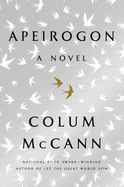
In a 2010 e-mail conversation in The Believer with Bosnian writer Aleksandar Hemon, Colum McCann observed, "I happen to think that an ounce of empathy is worth a boatload of judgment." That's the principle animating his magnificent novel Apeirogon, an unforgettable encounter with the Israeli-Palestinian conflict from both sides of the chasm separating the antagonists, that's audacious in both substance and form.
McCann (Thirteen Ways of Looking; Let the Great World Spin) anchors Apeirogon in the true stories of Palestinian Bassam Aramin and Israeli Rami Elhanan. In 1997, Rami's 13-year-old daughter, Smadar, was one of eight victims of a terrorist bombing on Jerusalem's Ben Yehuda Street. Ten years later, Bassam's 10-year-old daughter, Abir, was killed by a rubber bullet fired by an 18-year-old Israeli border guard. Already acquainted with each other through the organization Combatants for Peace, and now linked by these twin tragedies, Bassam and Rami eventually unite as passionate advocates for a peaceful end to the conflict.
Apeirogon is a word describing a geometric shape with a countably infinite number of sides. McCann tells these stories in numbered sections, some of them as short as a few words, others several pages in length. At the precise center of the novel, Rami and Bassam are allowed to speak in their own eloquent voices about the devastating event that set each one's life on a radically different, desperately unwanted, course.
McCann's daring storytelling technique must be experienced to be understood fully. On a subject where beliefs are often etched in stone, Apeirogon's skillful blend of fact and fiction presents readers with a distinct challenge--to think for themselves. --Harvey Freedenberg, freelance reviewer

